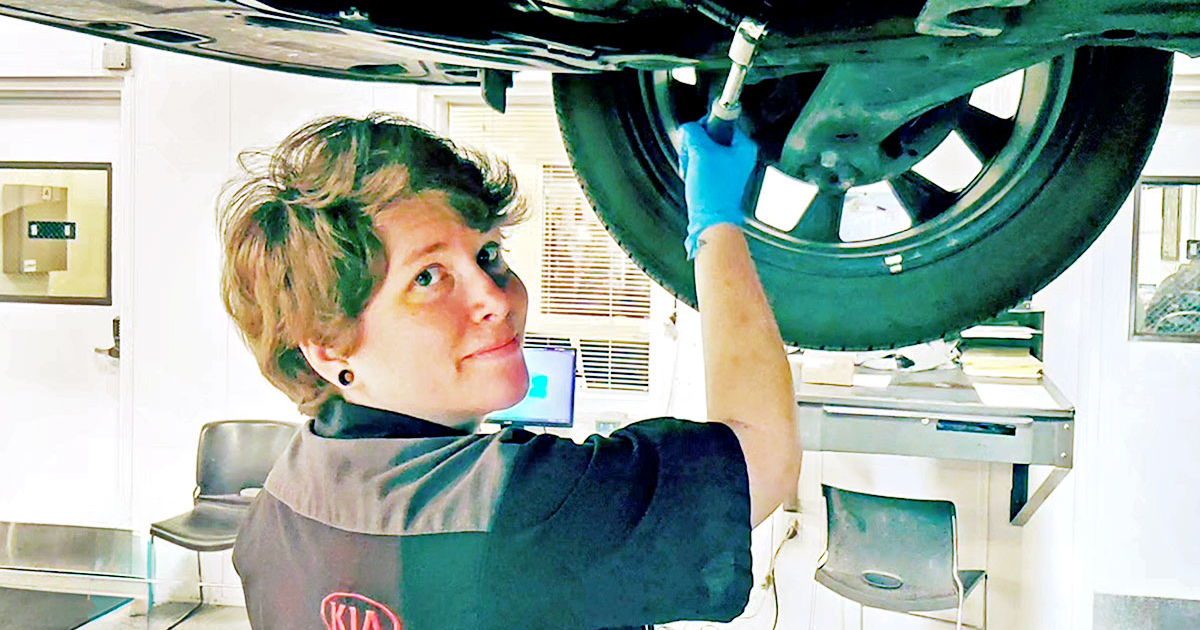
With projections putting the need for new service technicians at more than 10,000 over the next five years, the automaker is availing itself of a skilled labor pool of veterans retiring from the U.S. military.
Greg Silvestri, vice president of service and aftersale operations at Kia Motors America, said a high number of baby boomer technicians are now approaching retirement age.
“For Kia, with our sales successes and our huge growth of units in operation, the situation is even more pronounced as far as needing techs,” he said. “Not only do we need to replace those who are leaving, we need to grow our universe of technicians.”
To further this effort, the automaker has launched its Veterans Technician Apprenticeship Program to assist dealerships in finding new technicians. Kia partnered with Educational Resource Systems to find interested veterans in all branches of the military.
Veterans undergo a background check and an automotive technical aptitude test on which they must score 80 percent or above to be considered.
“In order to get into this training, they have to have the technical aptitude,” said Natae Rayner, director of Kia University, the automaker’s training program.
“They have to have had some sort of training background and experience in aviation, big fleets — anything that works on high-end electrical. Then they have to pass an extensive test that we have created.”
Those who pass get an interview with a dealership of their choice. More than 60 Kia dealerships nationwide have signed up for the program so far.
Terry Doyle, regional fixed-operations director for Asbury Automotive Group, has two dealerships that are registered to be a part of the program.
“We’ve had an initial consultation over how many technicians we need, what skill level we want and so on,” he said. “I always like to hire two at a time, especially with a program like this. There tends to be some camaraderie between them.”
Doyle also likes that candidates are given a robust automotive technical aptitude test. “Sometimes people have a higher opinion of their skills than they actually possess,” he said.
But the need for technicians is so dire that he is not so picky, he added.
“Mindset and communication skills are at the top of my list,” Doyle said. “Hey, if they fixed copy machines and did a good job, we would consider them at this point.”
A hired veteran candidate spends 90 days at a dealership paired with a mentor learning specific tasks, takes web-based training and then begins light repair work.
After 90 days, in-depth training starts at a Kia University facility in either Chicago or Seattle, with a third site planned for Atlanta.
When candidates complete the training, they are what Kia considers a master-level technician. They are not labeled that, though, because they need more hours of experience. Following three years of tenure at a dealership, they become a certified master technician.
Rayner said her experience with a similar program at a different automaker showed vets often stick with the apprenticeship and the dealership.
“We found they stay much longer than a regular technician,” Rayner said. “They are very loyal, very dedicated and very grateful that this program was made available to them.”
Doyle said he likes that the Kia program has a structure.
“Coming from the military, you expect and thrive on structure,” he said. “It’s great this program has structure, not just for screening and hiring but onboarding too. So for at least the first six months, they will have a plan. That’s going to make the program successful.”
Kia charges participating dealerships $5,500 per technician, which includes recruitment, testing and training costs.
If a technician leaves within 180 days, Kia will either prorate the dealership’s cost or find them a new candidate. There is no cost to military vets who enroll.
Kia offers a toolkit and rolling toolbox at a special discounted rate for dealerships and veterans in the program.
The dealerships purchase the kits, which they can use as a retention tool or let the veterans pay down the price of the tools over time.
The Veterans Technician Apprenticeship Program is a registered apprenticeship program through the Department of Labor, meaning participants can receive a stipend for a year as part of the GI Bill.
Kia dealerships also must pay the veterans a wage while they go through training.
Doyle knows there will continue to be a shortage of technicians and applauds Kia’s efforts to find new ones from the military.
“We need to do all we can to find those interested in this line of work,” he said. “It’s tough and only getting tougher. There’s a higher hope for me in recruiting people who will stick because they likely have hands-on experience with vehicles and a structured mindset.
“All that leads to stability,” he said.